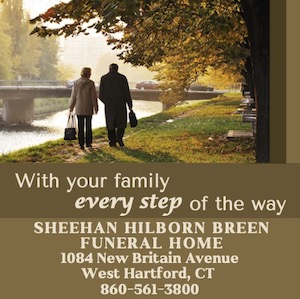
A West Hartford rabbi organizes a communal response to the tragedies in Orlando and Dallas
By Cindy Mindell
WEST HARTFORD – Rabbi Tuvia Brander and many of his congregants at Young Israel of West Hartford emerged at the end of Shavuot celebrations only to learn of the terrorist attack on the Pulse nightclub in Orlando.
Brander addressed the tragedy during his sermon the following Shabbat, tying together the highs and lows of the holiday weekend.
“I said, ‘We began last week by ascending the mountain, knowing that part of our role as Jews is not just going up the mountain but bringing the Torah down to the world and unfortunately, we came back into a world that was more imperfect, more fragmented and more in pain than we had left,’” he told the Ledger.
Brander suggested that the congregation craft a meaningful response to the suffering caused by the Orlando shooter.
“Paraphrasing the words of Rabbi Abraham Isaac Kook, in times of darkness, righteous people seek to add light,” Brander says. “We wanted to proactively do something positive to contribute to the world.” As a result, the rabbi and his congregants decided to organize a food drive at the synagogue to benefit the Anja Rosenberg Kosher Food Pantry at Jewish Family Services of Greater Hartford.
Not even a month later, five Dallas police officers were shot dead by a sniper. Again, Brander rallied Young Israel, sending an email of support to West Hartford Chief of Police Tracy Grove.
“We just wanted to show our support and gratitude for everything they do in the community,” Brander says. “We continue to develop that relationship.”
In his consequent sermons and conversations with congregants, Brander has expanded the conversation on the Jewish response to tragedy.
According to Jewish tradition, good deeds performed in reaction to suffering are not meant to make sense of evil or reverse the pain of its casualties. Rather, Brander says, “Jews do things to honor victims of tragedy, which is sometimes all you can do. When you do something to help someone in need, you are bringing joy to that person, which creates a generally positive effect. If you look at the world more on a cosmic level – which is more and more true with globalization and smartphones and Twitter and Facebook – you can have a pretty profound impact by adding a little bit of joy to someone’s life and doing a little bit to help someone else.”
In discussions with his congregation, Brander drew on the teachings of Rabbi Joseph Soloveichik (1903-93), an American Orthodox rabbi, Talmudist, and modern Jewish philosopher.
“He taught that the proper Jewish response to tragedy is not ‘why did that happen?’ but ‘what do I do in the face of that tragedy?’” Brander says. “We don’t have the ability to know God’s ways and we definitely don’t understand everything. But the question that we ask ourselves is how do world events and tragic events shape the way we respond and how do they compel us to action? I find that to be a more complex, sophisticated question than just trying to divine why something happened, a futile question that is beyond our knowledge. Rather, in the face of tragedy, how do we, through our values, respond? How do we, as people who stand up and say that this behavior is terrible and against everything that we believe is sacred – how does that call us to change and to move and to be proactive?”
Brander points to a Hebrew play on words that Soloveichik used to illustrate this concept: “It’s not lama – why did the tragedy happen? – but l’ma – what is our response meant to be?”
CAP: Rabbi Tuvia Brander delivers bags of groceries collected by his congregants to donate to the Jewish Family Service of Greater Hartford’s Anja Rosenberg Kosher Food Pantry to Patti Weiner, JFS administrative coordinator and development associate.








 Southern New England Jewish Ledger
Southern New England Jewish Ledger








